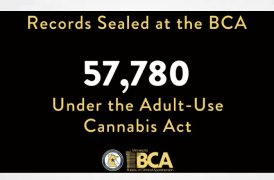Source: JD Supra
As cannabis products become legal in more and more states, commercial interest grows in protecting the trademarks associated with those products. The United States Patent and Trademark Office has maintained its refusal to register trademarks for most cannabis-based products on the ground that use of those products is federally unlawful. But what about state or common law rights in trademarks for cannabis products? In a recent order denying summary judgment, the Northern District of California in Kiva Health Brands, Inc. v. Kiva Brands, Inc. held that a party’s state and common law trademark did not confer trademark priority in a trademark infringement suit based on the federal Lanham (Trademark) Act.
BACKGROUND
Plaintiff Kiva Health Brands LLC (“Kiva Health”) sells health and wellness food and food supplements. Its first KIVA-branded products were sold in 2013. Its various KIVA trademarks were federally registered in 2014-16.
Defendant Kiva Brands, Inc. (“Kiva Brands”) is a leading provider of cannabis-infused chocolates and confections. Through its predecessors-in-interest, Kiva Brands launched its KIVA and KIVA CONFECTIONS brand in California in 2010, and expanded sales to other states in which cannabis products are legal. Kiva Brands registered its trademarks in the State of California in 2018.
About a year after learning of Kiva Brands’ use of the KIVA trademark, Kiva Health brought suit for trademark infringement, unfair competition, declaratory relief, and associated state trademark and unfair competition claims. Kiva Brands filed counterclaims. The parties then filed cross-motions for a preliminary injunction, which the Court decided on September 6, 2019.
THE PI RULING
The PI ruling discussed three motions: (1) Kiva Health’s Motion for a Preliminary Injunction; (2) Kiva Health’s Motion to Dismiss two of Kiva Brands’ counterclaims; and (3) Kiva Brands’ Cross-Motion for a Preliminary Injunction.
The key issue in all these filings was whether Kiva Brands’ undisputed prior use of the KIVA trademark in California on its cannabis products conferred on it prior rights in the mark. The Court stated that “[t]here is a paucity of trademark authority addressing what happens when a product’s legality differs under state and federal law, but what authority there is favors Kiva Health.” To hold otherwise “would be to put the government in the ‘anomalous position’ of extending the benefits of trademark protection to a seller based upon actions the seller took in violation of that government’s own laws”, citing CriAgri, Inc. v. USANA Health Scis., Inc., 474 F.3d 626, 630 (9th Cir. 2007).
However, since Kiva Health did not demonstrate a likelihood of trademark confusion at that stage of the proceeding, its motion for a preliminary injunction was denied.
THE SUMMARY JUDGMENT ORDER
The parties moved forward with discovery, after which Kiva Health moved for partial summary judgment on, inter alia, the question of Kiva Brands’ prior use defense. As the Court noted, it had addressed similar arguments at the preliminary injunction stage. “Although unlawful first use presents a relatively novel legal question, it is at least a purely legal question. The Court will address (1) the issue of Kiva Brands’ prior use of the mark on federally-illegal precuts, and (2) Kiva Brands’ argument that 15 USC 1065 requires a different result than the Court reached earlier.”
As the Court noted, to register a trademark, an applicant must show that the mark is in use in commerce, and the weight of authority has held that use in commerce means “lawful use.” The United States Patent and Trademark Office has routinely denied registration of trademarks for products whose use violates federal law. See, e.g., In re Morgan Brown, 119 USPQ2d 1350 (TTAB 2016) (denying federal trademark registration for HERBAL ACCESS for a retail store providing marijuana in violation of the Controlled Substances Act); In re JJ206, LLC d/b/a Juju Joints, 120 USPQ2d 1568 (TTAB 2016) (denying federal registration for POWERED BY JUJU and JUJU JOINTS for smokeless marijuana because the identified goods were illegal under the Controlled Substances Act). The Board has explained that even if the goods are lawful under state law that is “irrelevant to the question of federal registration when it is unlawful under federal law.”
The Court in Kiva Brands held that the lawful use requirement is also applicable to senior user claims and for petitions to cancel a registered mark. Here, Kiva Brands’ products are all infused with cannabis, which, while legal in California, remains illegal under federal law.
The Court considered and rejected Kiva Brands’ argument that Kiva Health’s trademark does not supersede the valid common law rights Kiva Brands acquired under state law. Although Kiva Brands only asserted its California common law rights to its KIVA mark, it did so as a defense to a federal trademark claim. As the Court wrote in its earlier preliminary injunction order, it was unwilling to extend the benefits of trademark protection in a Lanham Act case to a seller based on actions the seller took in violation of federal law.
Kiva Brands further argued that there were “prior use” defenses available under the Lanham Act. Section 1065 of the Lanham Act expressly states that a party can petition to cancel a mark where the “use of a mark registered on the principal register infringes a valid right acquired under the law of any State.” The Court noted, however, that Section 1065 concerns the incontestability of some trademarks. The dispute between these parties did not concern issues of incontestability.
More to the point, Kiva Brands argued, and the Court agreed, that the Lanham Act does not have a broad preemptive impact. The Court recognized it has been the law in the Ninth Circuit that the Lanham Act does not preempt the field of trademark law, and that federal and state trademark and unfair competition laws can coexist and cooperate without conflict. However the Court found that this meant that state law may prevail where it affords a trademark owner greater protection than the Lanham Act. Where, as here, state law would permit confusing or deceptive trademarks to operate, the state law would, under the Supremacy Clause, be preempted, citing Golden Door, Inc. v. Odisho, 646 F.2d 347, 352 (9th Cir. 1980).
Thus, the Court held “[b]ecause the state law that allows Kiva Brands a common law right in the KIVA mark would encroach on Kiva Health’s federal trademark rights (thereby permitting a confusing trademark to operate and ‘infringing on the guarantee of exclusive use’ to the federal trademark holder), the Lanham Act preempts the state law.” Kiva Brands could not be the senior user of the KIVA mark.
The Court therefore granted summary judgment to Kiva Health on the prior use defenses.
* * *
The Court acknowledged that its ruling will present “great, possibly insurmountable, problems for the marijuana industry.” Producers and sellers of cannabis products are severely challenged in securing nationwide trademark rights in their products, and their trademarks are easily infringed from one state to another. Furthermore, it is not particularly feasible or economical for a cannabis producer to get licensed and offer products in every state in which it is legal. An acknowledgement of nationwide trademark priority – even if only based on state trademark registrations or common law – may often be important to secure producers’ and sellers’ investment in their trademarks and businesses.
Source: https://www.jdsupra.com/legalnews/lanham-act-preemption-of-state-law-60487/

















